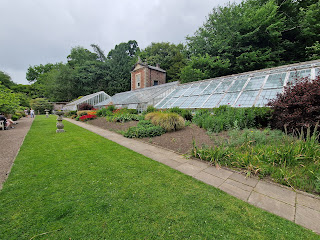DC and I spent last week in the lake district on an Edward Carpenter Community new year retreat. I took the following photo just after arriving.
Looking up Wastdale towards Wastdale Head / Great Gable.
This is the 'classic' view and fortunately the air and hence the lake surface was still, giving rise to a mirror where they met. Even if the water had been rippling and thus the reflection not present this would have been a striking view, with the mirror it is more so. The clarity of the reflection was so precise yet still preserving the wateriness. It wasn't until reviewing the picture that I noticed the stick in the bottom righthand corner. Zoom in and look at this. It has a majesty of its own.
Seeing this scene I immediately saw the parallel reflections - the mountain in the water and both in my mind. Many Zen koans point to this. For a second I mused on this before realising it didn't need any words.
Later in the week the moon was full and delightful in a clear blue evening sky. Viewed directly it seemed to occupy far more of the visual field than the tiny dot which appears in the following photo.
The moon is the small white dot fairly much in the centre of the picture. Almost insignificant in this picture, it assumed far more majesty when viewed with the naked eye. Again, I mused briefly on the moon's appearance in Zen koans. And recalling the mirror of the above picture I remembered Chiyono’s Bucket koan. This koan tells of a nun's enlightenment when the bottom fell out of the bucked in which she was carrying water. Her poem is translated thus:
With this and that I tried to keep the bucket together, and then the bottom fell out. Where water does not collect, the moon does not dwell.
I felt no need to dwell on these observations more and doubtless took myself back to the fireside for a warm. It was a cold week and the log fire was a very welcome companion!
The week was spent in the company of a lovely bunch of gay men and the heart energy was warm and nourishing. As ever living in community we're all there making mirrors for each other should we have the eyes to see ourselves in the reflection.
New year's eve we made a bonfire and celebrated the turn of the year with fireworks. After a bit the smoke from the fire seemed more troubling to me than the benefit of the warmth and I returned to the warmth of the fireside which benefited from a chimney. I took the following picture as I looked back towards the bonfire.
I find there's a magical quality to this picture and the word crucible comes to mind. It's so playful. An alchemy of love.
The week stitched together this and that with heart connection and was permeated with a gentle love.
It was nice that new year's eve was mid week as this let the week have a larger shape than had there been less symmetry.
Light filled the week in many regards.
One evening the sun cast a marvellous red glow upon the fellside in a hue resonant with that often pictured on Uluru / Ayers rock.
I overheard a snippet of conversation about the sacred nature of Ayers rock.
The English lake district is full of majesty. Mountains often feature in Zen with the streams that flow down them as the Buddha's tongue. The sound of water in nature reminding us that we see with more than our eyes.
There were long walks and short walks, high walks and low walks.
The wabi-sabi of this hut caught my attention. Looking at it now it seems to be sitting calmly in the tides of time as the sky sails by. And it was regarded with gentle affection by one of my walking companions who pointed it out to me as he led us onward. We nestled in the landscape full of our own reflections.
Later in that walk there was soft deep muddy ground with no obvious firm footing but we managed to traverse it without drama. I spied no lotus plants but it was an earthy reminder of the elements as had been the occasional day with icy winds and the amelioration of the fireside. I'd looked upon those of our group who seemed to be almost frolicking in the frigid water of the lake in their lunchtime swim with a sense of the exhilaration they would encounter and a sense of my own mortality! Ash does not return to firewood although we are both elements and the space that holds them. Yeah, yeah, whatever, says the little hut as I regard it in the picture now.
Friday evening brough the soiree and such talent! My 'turn' was later in the show and having watched so much enjoyable joy filled creativity I wondered how my opening to Shakespeare's Richard III, 'Now is the winter of our discontent...' would go down. In the end it was fine. At my last ECC event I'd 'done' Hamlet's 'To be or not to be...' Another 'heavy' one. I did consider Jaques 'All the world's a stage...' from Shakespeare's As you like it. But I'd done that for other groups and fancied trying something different.
Saturday brought our completion heart circle and I shared that I agreed with what one of the other men had said on a previous evening - living this way WAS normal - it's the world that's regarded as 'normal' that's 'shit'. The natural state of the human condition is one of heart connection, care, compassion and co-operation NOT dog eat dog.
Retreat from the world to come home to ourselves is the start of the voyage to the world. Through the reflections of our mind we land in the ocean of our heart. Yeah, yeah, whatever, says the little hut...







